Understanding Trigger Finger: Causes, Diagnosis, Treatment and Surgery
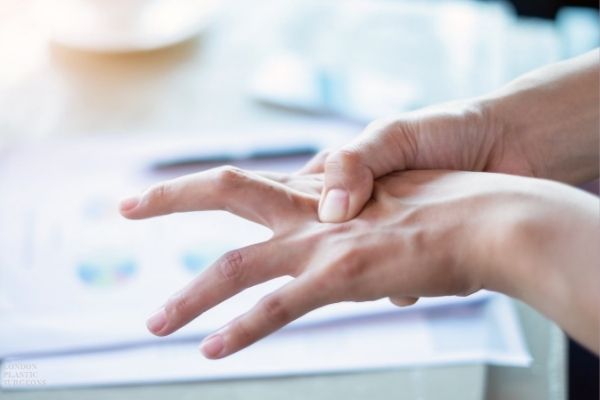
What is Trigger Finger?
Stiff and painful fingers? maybe you have trigger finger. Trigger finger is a medical condition where one or more of your fingers become locked in a bent position. The condition can affect any finger and can be present in both hands at the same time. Stenosing tenosynovitis is the medical term used by doctors to describe trigger finger. The name “trigger finger” comes from the resemblance of the index finger to the position it assumes when pulling the trigger on a gun.
The condition happens when the tendon that pulls on your fingers becomes entrapped in the surrounding tissue (called “sheath”). Trigger finger can be caused by activities that require forceful and repetitive bending of the fingers, like certain sports or job tasks. This can cause the sheath to become inflamed and narrow, restricting the tendon’s movement, and leading to your finger being stuck in a bent position.
Depending on the severity of trigger finger, Dr. Mark Gittos in London, United Kingdom can offer you one or more of the available treatment options.
Symptoms of Trigger Finger
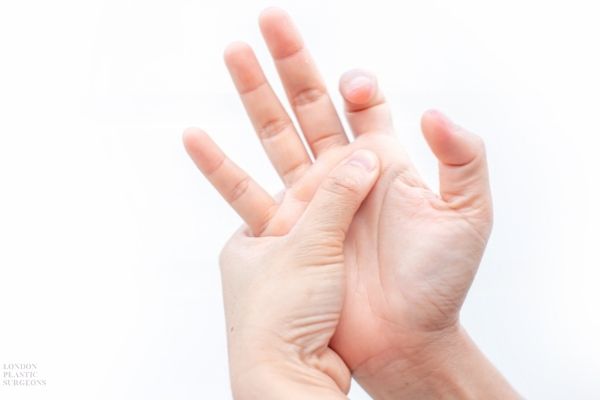
The following is a list of trigger finger symptoms. The severity of symptoms can vary depending on your specific condition:
● Stiffness in your fingers, especially in the morning
● Pain when straitening or bending your finger
● Clicking or popping in your finger when you move it
● Painful nodules (bumps) at the base of your finger
● Finger stuck in a bent position
These symptoms tend to be worst in the morning, when straitening the affected fingers, or when grabbing an object firmly. Trigger finger can affect any of your fingers, on one or both hands, and when it affects your thumb it’s called “trigger thumb”. If you are experiencing any of these symptoms frequently, give us a call and come see Dr. Mark for a full evaluation.
Causes of Stenosing tenosynovitis
Imagine the tendons as cords that extend from the tips of your finger to the muscles in your forearm. Each tendon connects one of your fingers to the muscle that moves it so that it pulls the finger when the muscle contracts. Connective tissue surrounds each one of your tendons to protect it, and this tissue is called a “sheath”. When the sheath becomes inflamed for any reason, it thickens and presses on your tendons restricting their movements. If the inflammation is longstanding or recurrent, scar tissue may form, and your finger might get locked in a bent position.
Risk factors for developing Trigger Finger
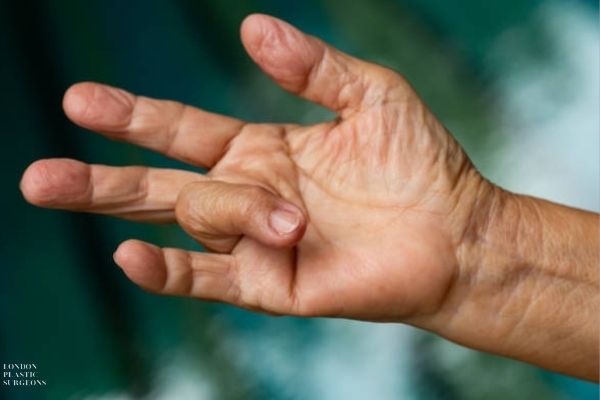
Doctors have been able to identify some factors that may put you at risk of developing trigger finger:
● Age: people aged 40 to 60 are at higher risk
● Sex: Women are more likely to develop trigger finger
● Certain medical conditions: People who have diabetes, gout, or rheumatoid arthritis have a higher risk of developing trigger finger
● Certain jobs: jobs and activities that require repetitive or prolonged grasping and bending of the fingers can lead to trigger finger.
● Previous surgery for carpal tunnel syndrome: People who had had surgery for carpal tunnel syndrome are more likely to develop trigger finger, especially in the first 6 months after surgery.
Diagnosis of Stenosing tenosynovitis
Trigger finger is usually diagnosed without any special testing. Your doctor will examine your hands and finger joints and ask you about your symptoms. The doctor will palpate your fingers and palms to try and feel any nodules. He will ask you to move your fingers to search for any stiffness, popping, or clicking. This is usually enough to establish the diagnosis.
Treatments for Trigger Finger
There are several suitable treatment options available for Stenosing tenosynovitis. Dr. Mark will recommend one or more of the following depending on the severity of your condition:
Conservative therapy for Trigger Finger
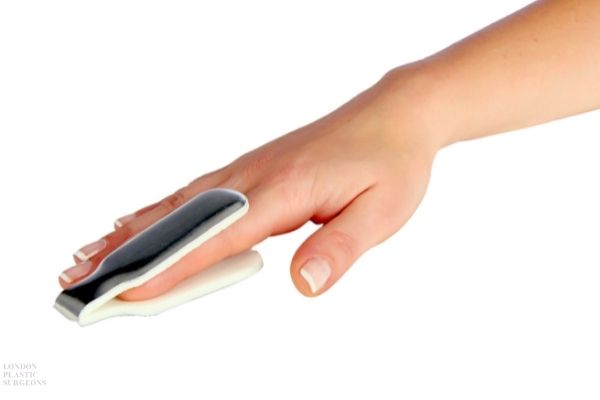
● Resting: The first thing that you can do to reduce your symptoms is to avoid activities that include finger bending and prolonged grasping.
● Splints: You might be asked to wear a splint at night for some time. This will protect your fingers while you sleep, and keep them in an extended position through the night.
● Stretching: Exercises that stretch your fingers might be effective in reducing symptoms and maintaining mobility.
● Anti-inflammatory drugs: You might be prescribed certain anti-inflammatory drugs like aspirin or ibuprofen. These drugs will help ease out the pain, however, they’re unlikely to reduce the inflammation and constriction around the sheath, so mobility of your fingers might not improve.
If conservative therapies provide little relief then surgery may be an option.
Trigger Finger Procedures & Surgery
● Steroids injection: Dr. Mark might inject steroids around the affected tendon to reduce inflammation and improve mobility. More than one injection may be required before achieving results. Improvement is usually temporary, and you might need another course after a year.
● Percutaneous release: This is an office-based procedure. Mr Gittos will inject a local anesthetic into the finger being treated. He will then insert a needle through your skin to try and free the tendon from surrounding tissue by manipulating the needle and your finger at the same time.
● Surgery (tenolysis): In more severe cases, Dr. Mark might recommend trigger finger release surgery, which is usually done in an operating room. A small incision is done at the base of your finger, and Dr. Mark will try to surgically free the tendon from the surrounding sheath, allowing it to move more freely.
Risks and Complications of Hand Surgery
Like any other surgery, there are some associated risks of surgery:
● Surgical site infection
● Sore fingers
● Stiffness
● Nerve damage
● Bowstringing
● Complex regional pain syndrome
Recovery after Trigger Finger Surgery
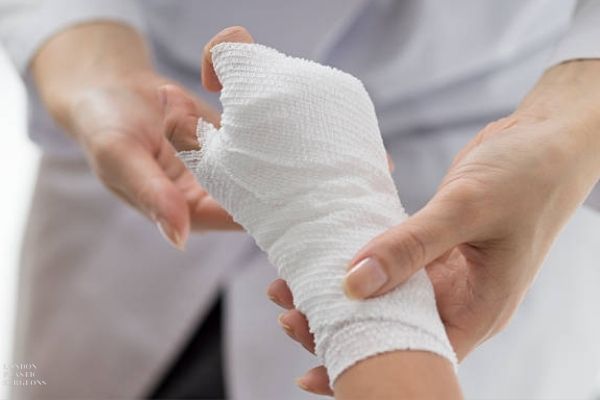
Every person recovers at a different pace depending on their specific condition and the treatment type they had received. You might be asked to wear a splint for a few weeks after surgery to keep your fingers in an extended position. You will need to rest your hands and might be prescribed anti-inflammatory drugs to ease the pain. You will usually regain mobility immediately after surgery, however, you will need a few weeks to fully recover. Some degree of swelling and stiffness might persist for a few months after surgery.
If you think you might have trigger finger, come visit Dr. Mark Gittos in London, United Kingdom. Dr. Mark is a certified plastic surgeon and has extensive experience in hand surgery and treating hand disorders. Give us a call to learn more about the services we provide.
Further Reading – Medical References
- Understanding Stenosing Tenosynovitis
- More About Trigger Finger Surgery
- Article about Stenosing Flexor Tenosynovitis
Finding a Hand Surgeon in London
For many men & women in United Kingdom suffering from Trigger Finger, having hand surgery is a life-changing experience. There are many qualified hand experts and plastic surgeons, but it is always best to find one who is experienced in hand surgery procedures. Find an experienced surgeon who you feel comfortable with and have a look at their online reviews to find out what their past patients say.
Why Choose Mr Mark Gittos – London Plastic Surgeon?
With a wealth of surgical experience and training, Mr Gittos is dedicated to best-practice patient care and education, customising Hand Surgery for each and every patient to best meet their needs and desired surgical outcomes. Mr Gittos has a current FRACS membership and significant hand surgery experience.
Make an Appointment for a Hand Consultation with Mr Gittos
If you have any symptoms that might be related to trigger finger, give us a call to make an appointment for a consultation with Dr. Mark Gittos in London, United Kingdom. Dr. Mark is a plastic surgeon who is experienced in treating hand disorders, such as trigger finger, De Quervain’s syndrome, cubital and radial tunnel syndromes, carpal tunnel syndrome, ligament disorders, and tumours or ganglions. Come visit us to get a full assessment of your condition and learn about your treatment options.
About Mr Mark Gittos FRACS (Plast) – London Plastic Surgeons
Practice locations in London & Essex, UK and Auckland, New Zealand.
Mr Mark Gittos offers high quality, natural-looking cosmetic surgery results and is highly experienced in Breast, Body and Face Surgery having performed over 4000 Surgeries in the last 26 years.
With world-wide expertise Mr Gittos is an expert in breast, face and body surgery for men & women.
Mr Mark Gittos is a leading Specialist Plastic Surgeon and operates a practice in London UK and Auckland New Zealand. His practice focuses on both surgical and non-surgical procedures, each designed to help restore, improve or change a physical characteristic or problem. The first step in every case is to talk through your personal requirements and explore all the options, before deciding on the most effective solution.
Naturally, before any treatment is begun, we will explain clearly the advantages and risk factors; so that you have the information you need to make an informed decision that is best for you. Visit the practice to find out more.

NEXT STEPS
Do your Research
- Read the Website and Blogs relevant to your procedure
- Browse our Frequently Asked Questions including how to choose a Surgeon for your procedure
- Download the Guides to Surgery
What to Bring to your Plastic Surgeon Consultation
- Bring a friend or relative to help discuss the information and your choices
- Take lots of notes and read the documents provided thoroughly
- Want more information before scheduling your consultation?
Book your Initial Surgery Consultation
- A Referral from your GP or specialist is helpful but NOT essential – you can have a consultation without a GP Referral
- Email us or Call in London on 07557 858156 to arrange your surgeon consultation appointment.
- Secure your consultation with Mr Gittos by paying the Consultation Fee in advance
- A consultation with Dr Gittos is £195.
Please contact us to arrange to book a consultation or to speak with our Patient Care Advisor.
Send an enquiry form today or UK phone 07557 858156 during Clinic Hours
